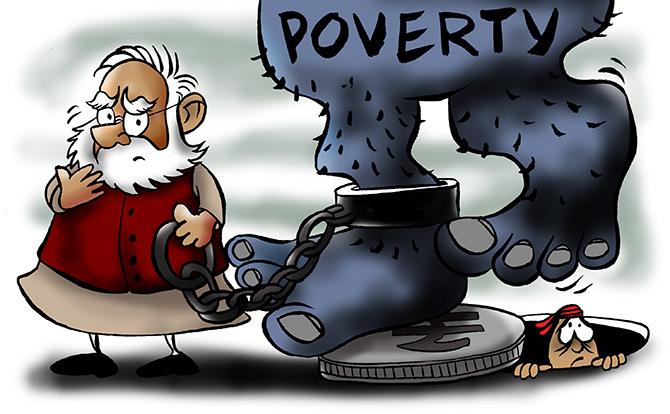Chief Economic Advisor (CEA) V Anantha Nageswaran considers absolute poverty a more direct and pressing concern for India.

He argues that inequality is a relative concept.
Simultaneously, with formerly economically deprived sections joining the ranks of the middle class, policy attention needs to extend beyond ‘roti, kapda, makaan’ to keep the growth engine up and running.
In an essay titled ‘Perspectives on the Inequality Debate in India,’ Nageswaran observes that, in contrast to advanced economies where higher inequality led to adverse socioeconomic outcomes, the Indian experience has been one of convergence between growth and inequality rather than conflict.
The CEA notes that for a developing country like India, where the growth potential is high and the scope for poverty reduction is significant, the focus needs to remain on rapidly growing the size of the economic pie, at least for the foreseeable future.
Terming redistribution of wealth as a solution to raise living standards and alleviate poverty and inequality as problematic, the CEA calls for raising the average income several times to afford a decent standard of living for everyone.
This makes continuous high economic growth a prerequisite for poverty alleviation.
Additionally, the CEA views middle-class expansion as the future of poverty and growth.
It is seen as the engine of demand and self-sustained growth for a developing economy, enabling a self-sustained growth cycle by consuming, saving, and human capital accumulation.
“Thus, considering its economic significance, policy attention towards the middle class involves looking beyond a polar view of a rich versus poor economy and beyond the charitable notion of redistribution towards rights-based claims for economic justice.
"In the empowerment of this class lies the path to a self-sustained, virtuous growth cycle,” he adds.
Noting that fiscal policies play a key role in reshaping income distribution in an economy, CEA notes that India’s taxation policies are progressive, as a large part of the taxes is collected from the top 10 per cent of the population.
Also, in India, expenditure on public goods has led to the redistribution of about 6 per cent of the national income to the bottom 50 per cent.
“Bad inequalities, such as unequal access to education and health, directly reduce the growth potential, besides being unfair to the individual.
"These form one of the most entrenched problems of development, whose mitigation lies in a strategic, long-term effort.
"Towards this end, several efforts are underway, a steadfast commitment to which will nurture the human capital in the country, making it the strongest pillar of India@100,” the CEA noted.
"Policy attention needs to extend beyond the “roti, kapda, makaan” class to keep the growth engine up and running.
Indian experience has been that of convergence between growth and inequality rather than of conflict.
Raise the average income several times to afford a decent standard of living for everyone.











